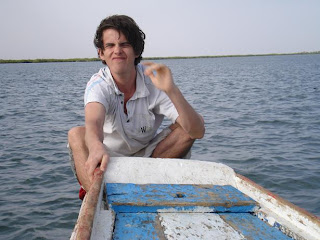Sadly it was stolen after a couple of weeks here (much like the mobile). Don't blame anybody but myself to be honest. But thought I'd give you some of the ones so far, having just noticed a terrible neglect of the same.

Markets... everybody knows I love markets. This one's clean. But there's dozens of them in Dakar. Fish, spices, tourist stuff, Chinese imports... you name it. My personal favorite is the fabric market (marche HLM), with at least 300 tailors in it. The astonishing thing is the tendency to cluster. According to Porter its a sign of a healthy economy. But here it makes no sense. For instance I am just having a travelling case made covered in old tin cans. The stuff is original, and great. But if you want it, you have to go to one specific part of town to look for it. Makes no sense if you ask me. Why don't they spread out?

Ever wondered why some African fabrics shine. Well, this labour is why. Pence per meter. Crazy! Somewhere near the HLM market mentioned above.

Fishing in Africa

Dead fish

Lunch

Lots of dead fish. This stuff is killed, smoked and sent to landlocked places like Mali. Reminds me of spending a few hours on the back of a pick-up truck laden with the stuff in the north of Mozambique. Never smelt like that before...

Me with catch. I don't think I'll ever do it again though. They didn't kill the thing. Just let it choke and suffer. Horrible!

Baas with penis extension. He's the flatmate out here. From Luxembourg. Engineer.

Rhino, White Rhino. We did the token safari in the tiniest little park outside Dakar on the way to Sine. It was a sad sight. None of the animals were from here, and to "entertain" they raced the hyena's with the 4x4. Not cool!

Chilling in the middle of nowhere. This cleared piece of land will soon be a Formula 3000 racetrack. I mean HDI of 155 or so and having an international RACETRACK? Whats going on. But I guess they should build on competitive advantage that the Paris/Plymouth/Lisbon/Amsterdam/Barcelona-Dakar rally has brought.

Pirogue (traditional, colourful wooden boat they have all over the place) by Senegalese sun set. That's supposed to be a pun. There's no sunset here. Nearly always hidden behind a thick veil of water vapour rising from the ground. The depth of colour here is slightly disappointing. Looking forward to India in that respect.

Me fooling around on front of said pirogue.

Pretty flower

Eleni & Baas at breakfast. Don't they look happy?

One of the colourful car rapide's that I still consider the most effective means of public transport anywhere. Its free market working beautifully. They are trying to get the things off the road. Will be sad to see them go.

Me in said machine.

Later that day, standing on the street not really knowing what to do, we saw a huge crowd trying to get into the university campus. Followed, obviously, but weren't let in. After a climb through the gate we encountered this. A gig of a famous Wolof band (don't ask me WHAT they were called) with people hanging from every possible spot. Managed to push our way into the back of the crowd (god, I'm happy I am tall) and took in the whole thing. My first real insight into Senegalese style partying (I'm pulled into the expat crowd most of the time). Small groups of dancers breaking away everywhere. Lots of man-on-man t-shirt pulling stuff going on. But not in the homosexual kind of way!
(NB: I have come to think that we Europeans need some reeducation to get the pervasive homophobia out of us. At first even I was shocked by how long men hold hands at a greeting here. They are not scared of touching. Bit like women in the West. Now I do it all the time. Same with dancers. At first I thought 1-on-1 man-on-man was a sign of Muslim society not leaving enough women for everybody or something like that (I know its ridiculous). Now I know its just another way for men to relate from what I used to. - If you think that is sexual you should see what they do to the women. Its like a dry-hump greeting.)
Lutte (Wrestling) teams preparing for a hot fight. Shame I caught so little of it on camera.





